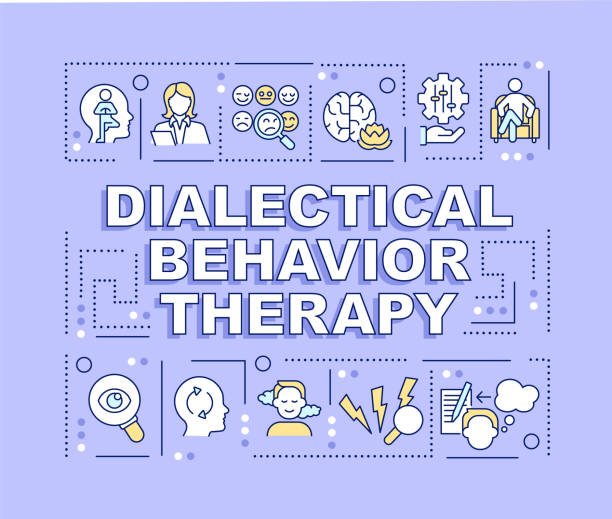
What is Dialectical Behaviour Therapy?
Dialectical behavioral therapy (“DBT” in English) is a type of talk therapy based on cognitive behavioral therapy (CBT), especially suitable for people with severe emotional distress.
Dialectical behavior therapy is designed to help you:
- Understand and accept your negative emotions
- Learn techniques to manage negative emotions
- Can bring positive changes to life
“Dialectic” means trying to understand two seemingly opposite things as having a chance of being the right approach. For example: Accepting yourself and changing your behavior may feel contradictory, but dialectical behavior therapy will teach you that it is possible to achieve both goals at the same time.
“Before receiving dialectical behavior therapy, I thought suicide was the only solution… Through the various skills taught in dialectical behavior therapy, I was able to overcome my feelings of depression and prevent myself from being swallowed up by depression.”
What is the difference between dialectical behavioral therapy and cognitive behavioral therapy?
- Cognitive behavioral therapy is a method that focuses on helping you change thoughts and behaviors that are not serving you.
- Dialectical behavioral therapy has the same effect, but it differs from cognitive behavioral therapy in that it provides treatment while focusing more on accepting one’s own identity. Dialectical behavioral therapy typically involves more group work than cognitive behavioral therapy. A Dialectical Behavior Therapy therapist will expect and encourage you to make positive changes.
What conditions can Dialectical Behavior Therapy treat?
Research has proven that dialectical behavioral therapy can help solve the following problems:
- Self harm
- Suicide attempt
- Depression
Since this treatment was originally developed for patients with borderline personality disorder (BPD), most cases to date involve patients treated for this disorder. Some medical facilities may offer dialectical behavioral therapy to treat the following people/conditions:
- Children and teenagers
- Drug and alcohol problems
- Eating disorder
- Aggressive behavior (crime).
However, even if you have the above symptoms, syndrome differentiation behavioral therapy may not be suitable for you.

“After a few months, I found that although my feelings and most of my symptoms remained the same, my ability to manage my emotions had improved dramatically. In fact, I can now live my life without incident.”
Dialectical behavioral therapy may be more suitable for you if you are:
- You have made up your mind to make positive changes for yourself
- You are ready to be active in treatment and work hard to complete your homework
- You have made the decision to focus on your present and future, not your past
- You are willing to work with others in group activities if necessary.
Some people like working in groups, while others find it difficult to work with others. You may prefer individual therapy with a dialectical behavior therapist. Talk to your doctor about the arrangement that will work best for you and see if it’s practical.
Please remember that everyone experiences treatment differently.
“I was very nervous about participating in Dialectical Behavior Therapy group activities. At the beginning, I didn’t know how to share and I didn’t make eye contact with other people, but everyone was very supportive. In the end, I became more confident, even Taught a skills training session to other group members.”
What is the treatment schedule for dialectical behavioral therapy?
Different types of Dialectical Behavior Therapy services may vary. Please see below to learn more about the Dialectical Behavior Therapy approach and what it includes:
Preparation services for dialectical behavior therapy
Some therapists may provide you with a dialectical behavior therapy assessment or treatment preparation service. During this time, your therapist will learn how DBT is right for you. They may offer you a few sessions to familiarize you with the Dialectical Behavior Therapy model. If you later decide that treatment is right for you, they will ask you to commit to treatment.
Individual therapy
Individual therapy usually refers to weekly individual sessions with a dialectical behavior therapist. Each session lasts approximately 45 – 60 minutes.
Individual treatments have multi-level goals:
- Reduce suicidal and self-harm behaviors to ensure your personal safety
- Reduce behaviors that interfere with treatment
- Help you achieve your goals and improve your quality of life by solving current difficulties; these difficulties may be other mental health problems, such as depression or auditory hallucinations, or they may be related to your personal life, such as employment or relationship problems, etc.
- Help you learn new skills to replace unhelpful behaviors and help you achieve your goals
Your dialectical behavior therapist may ask you to fill out journal cards as homework and bring them to therapy sessions. This allows you to record your emotions and behaviors and learn about life patterns and triggers. You and the therapist can use this information to decide together what to do in each class. You can find sample journal cards on the Dialectical Behavior Therapy Self-Help website.
“I’ve learned that emotions are not my enemy. Emotions are not only useful, but they have a unique function. I still feel my mood swings strongly, but I can now recognize them and know how to be good without hurting myself. Manage them.”

Skills training group
During the treatment, the dialectical behavior therapist will teach you different techniques in a group format. This is not group therapy, but a series of teaching sessions.
Typically a group will have two therapists and may have sessions once a week. Sometimes the room will be set up like a classroom and your skills trainer will sit in the front. The course is designed to teach you some daily living skills.
Courses typically contain four skills units:
- Mindfulness:
This set of skills allows you to focus on the present rather than worrying about the past or future. Meditation units may appear in other units as well. Dialectical behavior therapy classes usually begin with a brief mindfulness exercise. See our resources on mindfulness for more information. - Distress Tolerance:
This means learning to handle crises without engaging in self-harming behavior. - Interpersonal efficacy:
It means learning to make requests and reject others on the premise of respecting yourself and others. - Emotion Regulation:
This group of skills helps you understand, notice, and better control your emotions.
In a group class, the therapist may ask you to do group exercises and role plays. You will also complete homework assignments each week to help you practice these skills in your daily life.

Telephone crisis counseling
Telephone crisis counseling is a method often used in dialectical behavioral therapy to provide support for your daily life. This means you can call your therapist for support during your session, for example:
- When you need help coping with an immediate crisis (such as suicidal thoughts or self-harm)
- When you are trying to use Dialectical Behavior Therapy skills but would like some advice on related techniques
- When you need to repair your relationship with a therapist
But you need to ask your therapist whether this service is available, and your therapist should clearly set some guidelines for this telephone crisis counseling service in advance, such as:
- Calls are usually brief
- The call should take place within a mutually agreed upon time
- In special circumstances, they may ask you to wait 24 hours before calling them
“If I had a breakdown or a crisis, she would help me understand why.”
During the session, the dialectical behavior therapist will use an equal amount of acceptance and change techniques.
Receptive skills
Reception skills focus on:
- Know yourself
- Understand why you might do things like self-harm or substance abuse
A dialectical behavior therapist may explain to you that this has been your only way to cope with strong emotions. So while it can cause long-term damage to you and may turn off those around you, your behavior is understandable.
“Finally someone agrees with me instead of saying ‘What you are doing is wrong!’ all day long.”
Change skills
Change techniques focus on replacing behaviors that hurt you with behaviors that help you. This means your therapist may:
- Challenge your unhelpful thoughts
- Encourage you to find new ways to deal with difficult situations.
“It’s not something that can be done in a few days… you have to do it every day. It’s not easy, and even though I’ve been through treatment for about two years now, it’s still a constant struggle.”
Do I need to accept my diagnosis to get Dialectical Behavior Therapy?
Because Dialectical Behavior Therapy is designed to treat Borderline Personality Disorder (BPD), it may be easier for you to receive Dialectical Behavior Therapy services if you accept that you have this disorder. But personality disorder is a controversial diagnosis. If you don’t like this disease label, don’t feel alone, as many people feel the same way.
Remember, no matter how you view your problems, Dialectical Behavior Therapy can help you solve them.
Can I do Dialectical Behavior Therapy on my own?
Unlike cognitive behavioral therapy, teaching yourself dialectical behavioral therapy techniques can be difficult. It can also be overwhelming when you begin Dialectical Behavior Therapy. Therefore, doing therapy on your own is often not as effective as receiving a classroom session with a trained therapist.
Taking formal courses can help you:
- Stay positive when you feel like giving up
- Find situations where you can practice dialectical behavior therapy skills
- Feel supported and not alone because others in the group are going through the same process
But you may be able to find self-study textbooks on dialectical behavior therapy online, which may include diary cards, exercises, and behavior analysis sheets. You can use these materials at the same time or after you complete the formal course to refine the dialectical behavior therapy skills you have learned. The Dialectical Behavior Therapy Self-Study website can provide these resources.
You can read more about Dialectical Behavior Therapy on the official website BehavioralTech












